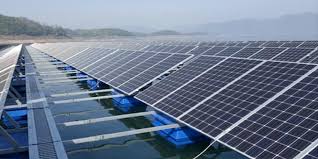Ahmedabad
(Head Office)Address : 506, 3rd EYE THREE (III), Opp. Induben Khakhrawala, Girish Cold Drink Cross Road, CG Road, Navrangpura, Ahmedabad, 380009.
Mobile : 8469231587 / 9586028957
Telephone : 079-40098991
E-mail: dics.upsc@gmail.com

Mini-solar grids to fight Energy Poverty
News: There is a private sector-led revolution underway to lift 500 million people out of energy poverty. The transformation is thanks to clean energy mini-grids that are popping up in rural communities.
Background:
• According to the World Bank — which recently set a target to fund a thousand mini-grids in Nigeria, where over 90 million people still live without electricity — private sector owned and operated solar mini-grids are the most cost effective and sustainable way to bring electricity for the first time to 75 per cent of the 675 million people worldwide who still live in darkness, most of them in Sub-Saharan Africa.
What are Mini solar grids?
• Mini solar grids, also known as solar mini-grids, are local electrical networks powered by photovoltaic panels, diesel generators, or a solar battery. They are small power stations that are scaled-down versions of city power grids. These grids can continuously power an entire village or town, without connecting to the national power grid, at a competitive price.
• The size of these grids usually ranges between 10kW and 10MW.
Advantages:
• Reliable and clean power to these unserved communities
• Also offer range of other services that drive rural prosperity — mobile telephony, irrigation, agroprocessing, e-mobility.
• The play a crucial role in climate-vulnerable regions without centralised grid infrastructure.
• Solar mini-grids can flexibly scale based on community energy needs, providing adaptable energy access solutions.
• They have become the least-cost way to bring high-quality 24/7 electricity to towns and cities off the grid or experiencing regular power cuts5. The cost of electricity generated by solar mini-grids has gone down from $0.55/kWh in 2018 to $0.38/kWh today.
• In India, about 700 solar mini-grids are owned and operated by a handful of private companies. These grids are largely in the states of UP, Bihar and Jharkhand, which have seen significant progress on a number of sustainable development goals based on the success of these mini-grids.
Challenges:
• Mini grid customers often have low and irregular incomes, which limit their power consumption and ability to pay for electricity.
• Mini grid systems require high-quality components and skilled technicians to ensure their reliability and efficiency. They also need to cope with the variability and intermittency of solar power, and balance the supply and demand of electricity.
• Mini grid projects have high upfront costs and long payback periods, which make them unattractive for conventional financiers.

Address : 506, 3rd EYE THREE (III), Opp. Induben Khakhrawala, Girish Cold Drink Cross Road, CG Road, Navrangpura, Ahmedabad, 380009.
Mobile : 8469231587 / 9586028957
Telephone : 079-40098991
E-mail: dics.upsc@gmail.com
Address: A-306, The Landmark, Urjanagar-1, Opp. Spicy Street, Kudasan – Por Road, Kudasan, Gandhinagar – 382421
Mobile : 9723832444 / 9723932444
E-mail: dics.gnagar@gmail.com
Address: 2nd Floor, 9 Shivali Society, L&T Circle, opp. Ratri Bazar, Karelibaugh, Vadodara, 390018
Mobile : 9725692037 / 9725692054
E-mail: dics.vadodara@gmail.com
Address: 403, Raj Victoria, Opp. Pal Walkway, Near Galaxy Circle, Pal, Surat-394510
Mobile : 8401031583 / 8401031587
E-mail: dics.surat@gmail.com
Address: 303,305 K 158 Complex Above Magson, Sindhubhavan Road Ahmedabad-380059
Mobile : 9974751177 / 8469231587
E-mail: dicssbr@gmail.com
Address: 57/17, 2nd Floor, Old Rajinder Nagar Market, Bada Bazaar Marg, Delhi-60
Mobile : 9104830862 / 9104830865
E-mail: dics.newdelhi@gmail.com